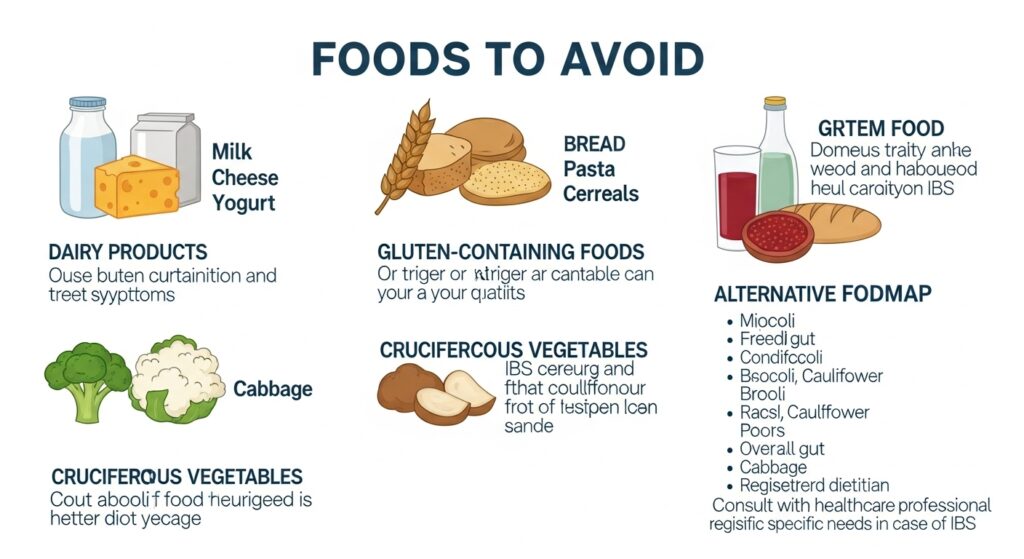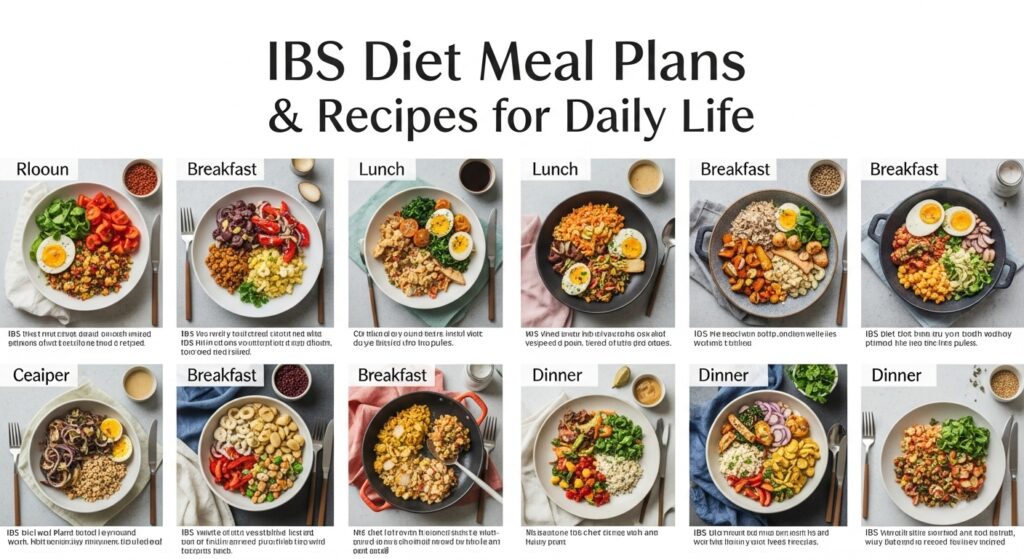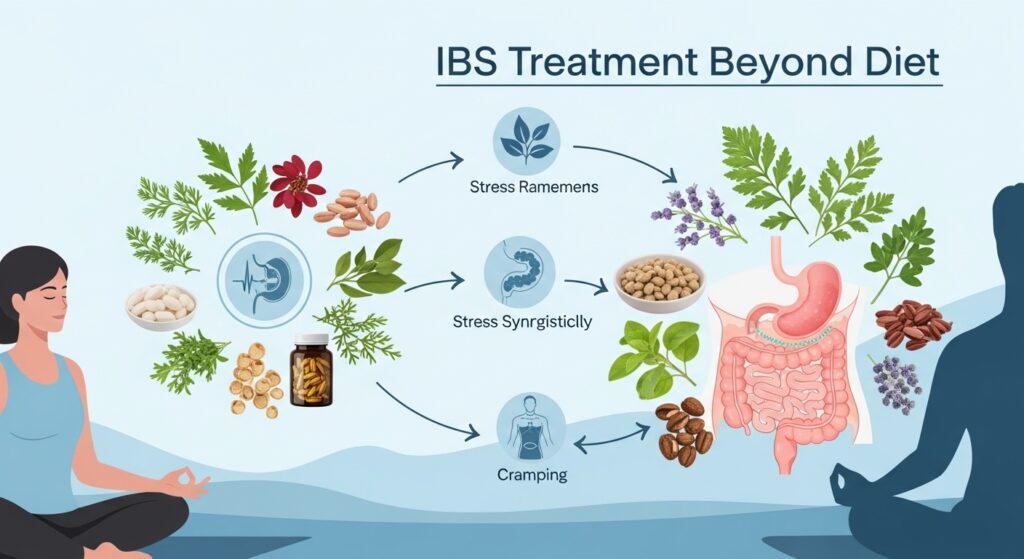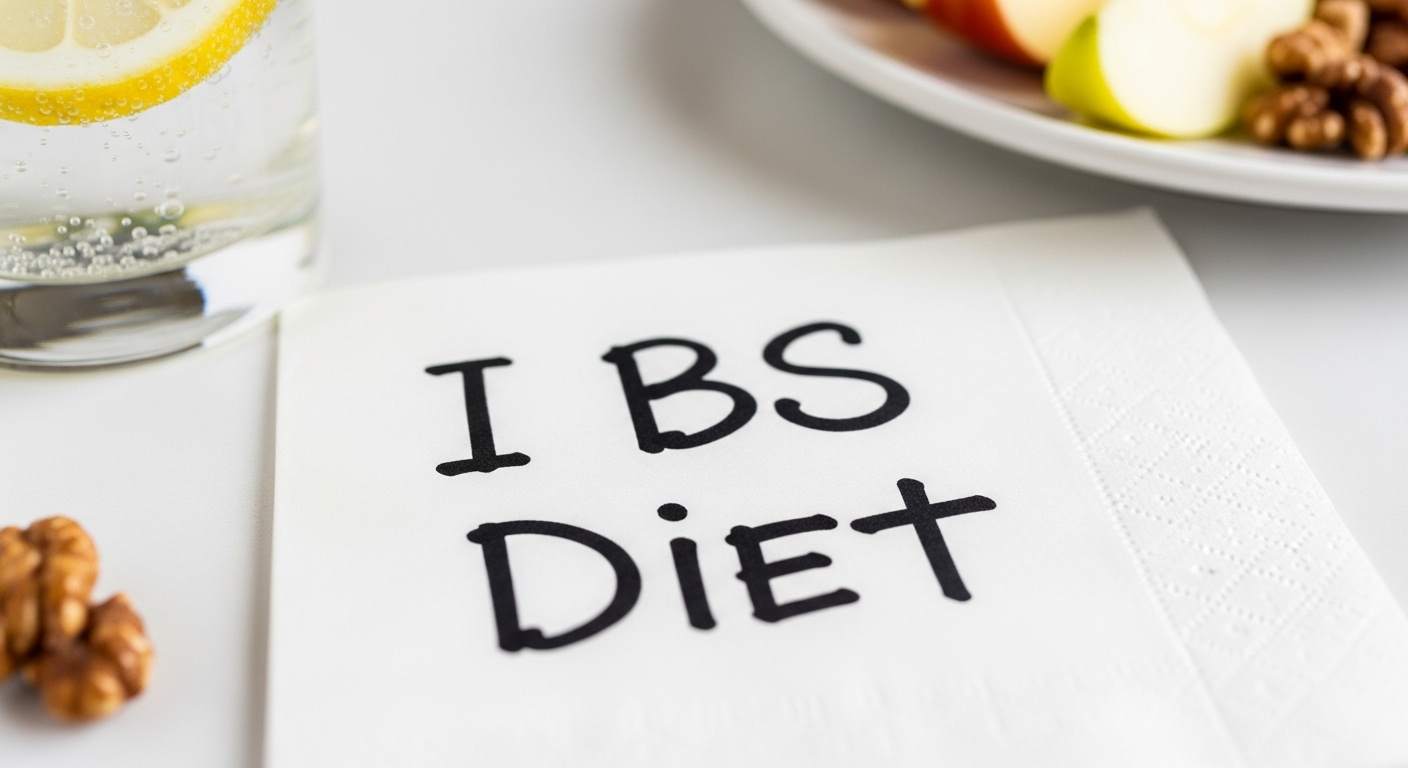Living with irritable bowel syndrome can be challenging. The good news is that proper dietary modifications can significantly improve your quality of life.
This comprehensive guide will help you understand which foods to embrace and which to avoid for optimal digestive health management.
What is IBS? Understanding Irritable Bowel Syndrome Symptoms
IBS is a common functional bowel disorder that affects millions worldwide. It’s a chronic gastrointestinal condition that disrupts normal bowel habits and causes significant intestinal distress.
Common gastrointestinal symptoms include cramping, abdominal pain, bloating, gas, diarrhea, and constipation. These symptoms can alternate between flare-ups and periods of relief. The gut-brain axis plays a crucial role in IBS, as stress and emotions can trigger symptoms.
Unlike other digestive disorders, IBS doesn’t cause permanent damage to your gastrointestinal tract. However, it significantly impacts daily life and requires ongoing nutritional management. Understanding your food triggers is essential for bowel health optimization.
READ THIS BLOG : 7 Types of Statistical Distributions with Examples and Real-World Applications
Foods to Avoid with IBS: Complete Trigger Foods List
Certain foods can worsen gastrointestinal symptoms and should be limited or avoided completely. Dairy products containing lactose often cause digestive comfort issues. Milk, cheese, ice cream, and butter can trigger bowel irregularities in lactose-intolerant individuals.
Fried foods are particularly problematic because they’re high in unhealthy fats. These foods move slowly through your digestive system, causing intestinal inflammation and discomfort. French fries, fried chicken, and donuts should be avoided.

Caffeine stimulates your gastrointestinal tract and can cause diarrhea. Coffee, energy drinks, and caffeinated sodas are common culprits. Alcohol also irritates the digestive tract and can worsen bowel dysfunction.
Cruciferous vegetables like broccoli, cauliflower, and cabbage contain compounds that can increase gas production. While nutritious, these vegetables may trigger symptoms in sensitive individuals. Beans and legumes also contain oligosaccharides that can cause intestinal distress.
Best Foods for IBS: What to Eat for Quick Relief
The right foods can provide irritable bowel syndrome relief and support digestive wellness. Lean proteins like chicken, turkey, and fish are easily digestible and won’t ferment in your gut microbiome.
Fatty fish rich in omega-3 fatty acids provide anti-inflammatory foods benefits. Salmon, mackerel, and sardines support intestinal health restoration and reduce inflammation throughout your digestive system.
Soluble fiber foods help regulate bowel movements and improve digestive comfort. Oats, bananas, and sweet potatoes are excellent choices. These gut-friendly foods absorb water and form a gel-like substance that soothes your gastrointestinal tract.
Probiotics are essential for gut microbiome balance. Yogurt, kefir, and fermented foods like kimchi introduce beneficial intestinal bacteria. These foods support digestive system support and may reduce symptom severity.
Low FODMAP Diet Plan for IBS Management
The low FODMAP diet is a scientifically-backed approach for gastrointestinal symptom control. FODMAP stands for Fermentable Oligosaccharides, Disaccharides, Monosaccharides, and Polyols. These are short-chain carbohydrates that can trigger symptoms.
This elimination diet involves three phases. First, you eliminate high-FODMAP foods for 2-6 weeks. Then, you systematically reintroduce foods to identify your specific food triggers. Finally, you create a personalized long-term eating plan.
Low-FODMAP foods include rice, quinoa, carrots, spinach, oranges, and grapes. These foods support bowel movement regulation without triggering symptoms. The diet requires careful meal planning and may benefit from professional guidance.
Research shows that up to 75% of IBS patients experience significant digestive health improvement with this approach. It’s considered one of the most effective dietary interventions for functional digestive disorder management.
IBS Diet Meal Plans and Recipes for Daily Life
Creating an IBS-friendly meal plan doesn’t mean sacrificing taste or nutrition. Start your day with oatmeal topped with bananas and a small amount of nuts. This breakfast provides soluble fiber and sustained energy.
For lunch, try grilled chicken with quinoa and steamed carrots. This combination offers lean protein, safe grains, and easily digestible vegetables. Season with herbs like basil or oregano instead of garlic or onion.

Dinner might include baked salmon with rice and green beans. This meal provides anti-inflammatory foods and supports digestive tract health. Cooking methods like baking, grilling, or steaming are preferable to frying.
Snacks should focus on gut-friendly foods like rice cakes with peanut butter or a small banana. These options provide energy without triggering gastrointestinal symptoms. Meal planning becomes easier once you identify your safe foods.
Gluten-Free Diet for IBS: Does It Really Work?
Many IBS patients find relief with a gluten-free diet, even without celiac disease. Gluten can increase intestinal permeability and trigger digestive disorders in sensitive individuals. This condition is sometimes called non-celiac gluten sensitivity.
Gluten-free alternatives include rice, quinoa, corn, and certified gluten-free oats. These grains support digestive wellness without triggering symptoms. Many people report improved bowel habits within weeks of eliminating gluten.
However, simply removing gluten isn’t always enough. It’s important to focus on whole, unprocessed foods rather than relying on processed gluten-free products. These products often contain other food triggers that can worsen symptoms.
The effectiveness varies among individuals. Some people experience dramatic digestive health improvement, while others see minimal changes. Working with a healthcare provider can help determine if this approach is right for you.
Dairy and IBS: Lactose-Free Alternatives Guide
Lactose intolerance is common among IBS patients. Lactose is a sugar found in dairy products that requires specific digestive enzymes to break down. When these enzymes are insufficient, intestinal distress occurs.
Lactose-free alternatives include almond milk, coconut milk, and oat milk. These options provide similar nutritional benefits without triggering gastrointestinal symptoms. Coconut yogurt and dairy-free cheese are also available.
For those who can tolerate some dairy, aged cheeses like cheddar and Swiss contain less lactose. Greek yogurt may also be better tolerated due to its probiotic content and lower lactose levels.
Reading labels is crucial when avoiding dairy. Many processed foods contain hidden dairy ingredients. Dietary restrictions become easier to manage with practice and awareness.
IBS Treatment Beyond Diet: Natural Remedies
While nutritional therapy is crucial, other approaches can enhance digestive comfort. Stress management techniques like meditation and deep breathing can help regulate the gut-brain axis. Regular exercise also promotes healthy bowel movements.
Digestive enzyme supplements may help break down problem foods. However, these should be used under professional guidance. Some people benefit from prebiotic supplements that feed beneficial gut microbiome bacteria.

Peppermint oil has shown promise for abdominal pain management. It may help relax intestinal muscles and reduce cramping. Probiotics supplements can also support gut microbiome balance.
Heat therapy, such as a warm heating pad on the abdomen, can provide immediate relief during flare-ups. These natural remedies work best when combined with proper dietary modifications.
READ THIS BLOG : How to Grow Taller Naturally: Proven Methods That Actually Work?
Living with IBS: Long-term Diet Success Tips
Successful IBS management requires patience and consistency. Keep a detailed food diary to identify your personal food triggers. This helps create a personalized approach to gastrointestinal wellness.
Meal planning becomes essential for maintaining digestive comfort. Prepare safe foods in advance and always have backup options available. This prevents impulsive food choices that might trigger symptoms.
Building a support network of healthcare providers, including a gastroenterologist and registered dietitian, ensures comprehensive care. They can provide nutritional management guidance and monitor your progress.
Remember that IBS is a manageable condition. With proper dietary modifications and lifestyle changes, you can achieve significant symptom relief and improve your quality of life.
Frequently Asked Question
Can I eat spicy foods with IBS?
Spicy foods often trigger gastrointestinal symptoms and should be avoided during flare-ups. Start with mild spices and gradually increase tolerance.
How long does it take to see dietary improvements?
Most people notice digestive health improvement within 2-4 weeks of consistent dietary interventions. Individual responses vary significantly.
Are artificial sweeteners safe for IBS?
Many artificial sweeteners are high-FODMAP and can trigger symptoms. Natural sweeteners like maple syrup in small amounts may be better tolerated.
Can I drink alcohol with IBS?
Alcohol can irritate the digestive tract and worsen symptoms. If you choose to drink, opt for clear spirits and avoid mixers with high-FODMAP ingredients.
Should I take fiber supplements?
Soluble fiber supplements may help, but insoluble fiber can worsen symptoms. Consult with a healthcare provider before starting any supplements.
Conclusion
Managing IBS through diet requires understanding your unique food triggers and embracing gut-friendly foods. The low FODMAP diet, combined with gluten-free and dairy-free approaches, provides a solid foundation for digestive health management.
Success comes from consistent dietary modifications, stress management, and working with healthcare professionals. While the journey may seem challenging initially, the digestive wellness benefits make it worthwhile. Remember that irritable bowel syndrome relief is achievable with the right approach and patience.

David is a seasoned SEO expert with a passion for content writing, keyword research, and web development. He combines technical expertise with creative strategies to deliver exceptional digital solutions.







